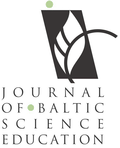UPPER-SECONDARY SCHOOL STUDENTS’ APPROACHES TO SCIENCE EXPERIMENTS IN AN EXAMINATION DRIVEN CURRICULUM CONTEXT
| Title | UPPER-SECONDARY SCHOOL STUDENTS’ APPROACHES TO SCIENCE EXPERIMENTS IN AN EXAMINATION DRIVEN CURRICULUM CONTEXT |
| Publication Type | Journal Article |
| Year of Publication | 2020 |
| Authors | Chirikure, T |
| Journal | Journal of Baltic Science Education |
| Volume | 19 |
| Issue | 4 |
| Start Page | 523-535 |
| Pagination | Continuous |
| Date Published | August/2020 |
| Type of Article | Original article |
| ISSN | 1648-3898 |
| Other Numbers | E-ISSN 2538-7138 |
| Keywords | divergent approach, iterative approach, linear approach, mixed methods, science experiments |
| Abstract | This research explored upper-secondary school students’ approaches when they engage in planning and conducting science experiments. Approaches to science experiments are important because they provide insight into students’ scientific reasoning and their enactment of scientific methods. An explanatory mixed-methods design was employed to determine and explain students’ approaches to science experiments. Data were generated by administering a 15-item Approaches to Science Experiments Questionnaire (ASEQ) on 211 participants and interviewing a smaller sample of 33. The linear approach was predominant while the divergent approach was least adopted by the participants. The teaching-learning context, substantive and procedural knowledge lead to specific approaches and the emergence of subcategories of the three broad approaches. Capable students engaged in a self-directed iterative approach while external help resulted in an assisted iterative approach. Rigid and contrived linear approaches were a result of time constraints, substantive and procedural shortcomings. Scattergun and blanking divergent approaches emerged from extreme weaknesses in substantive and procedural knowledge. Assessing practical skills through long-term projects is recommended to focus more on developing students’ scientific reasoning and process skills. Research with the ASEQ in other teaching-learning cultures, observing students in action and analysing their write-ups could provide deeper insights into approaches to science experiments. |
| URL | http://oaji.net/articles/2020/987-1597214143.pdf |
| DOI | 10.33225/jbse/20.19.523 |
| Refereed Designation | Refereed |
| Full Text |
